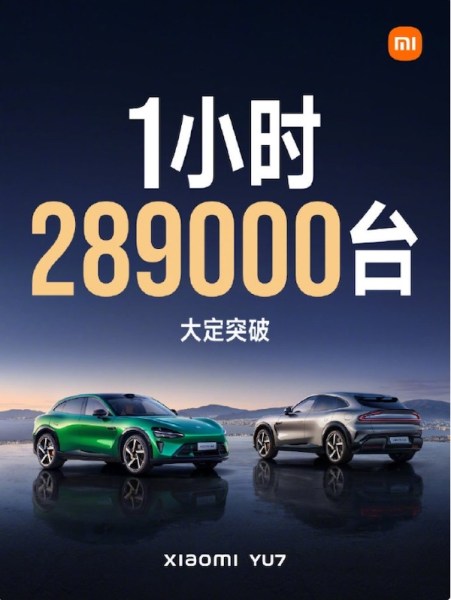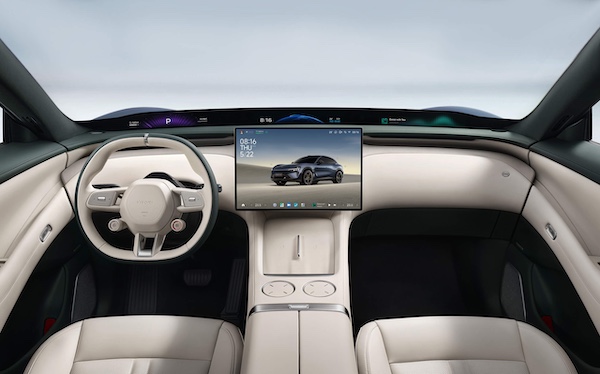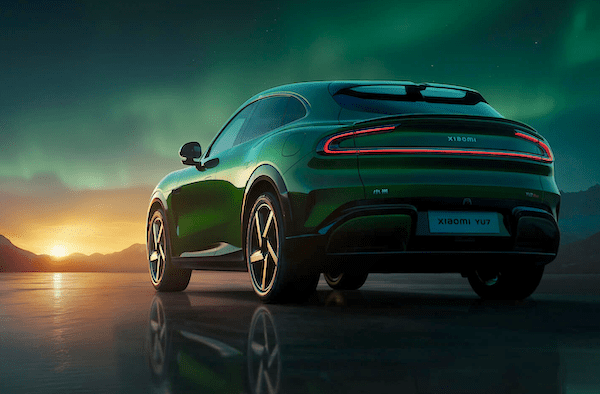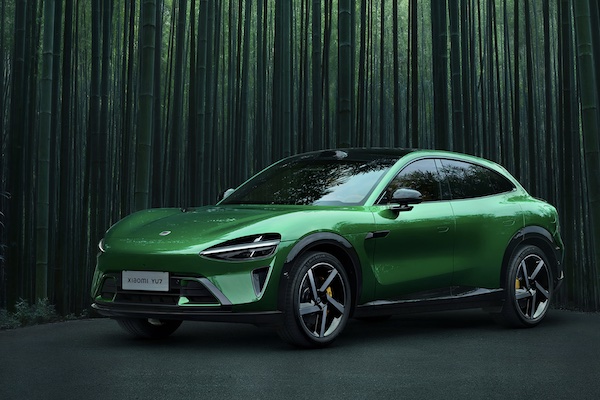The electric vehicle scene has just received a major jolt with the official launch of the Xiaomi YU7, a car that has rapidly become one of the hottest topics among auto enthusiasts and industry insiders worldwide. For many Nigerians and West Africans, discussions surrounding electric vehicles (EVs) usually revolve around questions of affordability, practicality on local roads, and whether these cars are truly the future for African drivers. But with the storm of attention surrounding the Xiaomi YU7, the conversation is set to change yet again.
According to Xiaomi’s official launch statistics, the YU7 racked up an astonishing 200,000 orders within three minutes of its announcement, and that number surged to 289,000 in just one hour. This incredible rate of uptake sent shockwaves through automotive circles, signaling a significant milestone for the Chinese tech and auto giant. Industry analysts in Asia suggest that a deposit of 20,000 yuan (around 2,375 euros or 2,800 US dollars) provides instant order security and ensures swift delivery, given the manufacturer’s ready-to-ship inventory—a detail that will matter for importers, auto dealers, and keen buyers across Africa looking for quick access to the latest models.
The YU7 marks Xiaomi’s second venture into electric vehicles, following in the footsteps of the breakthrough SU7 sedan. The earlier SU7 made headlines with 50,000 pre-orders in just 27 minutes and hitting over 266,000 retail sales since its debut in March 2024. Yet, the YU7’s early demand is reported to be three times greater than that of the SU7’s debut, which could spell transformative change in the SUV segment globally and pose fresh opportunities and challenges for local African dealers and tech enthusiasts.
Comparing the YU7 to other industry heavyweights is inevitable. For instance, the Tesla Model Y, a favourite among urban, tech-savvy drivers, had a record 61,056 sales in December, according to public sales records. However, experts like Abuja-based automotive consultant Olumide Peters argue that the Xiaomi YU7’s rapid order numbers “demonstrate a latent hunger for advanced, affordable new-tech vehicles, especially from non-American brands.” He notes that this has implications not just for global competitors, but also for Nigerian importers who are always seeking vehicles that blend tech appeal, reliability, and competitive pricing.

Price, Specs, and What Nigerian Buyers Should Know
The YU7 comes out swinging with aggressively competitive pricing, catching the attention of consumers mindful of both affordability and value. The base model carries a price tag of 253,900 yuan (about 30,150 euros or 35,400 US dollars), directly undercutting the Tesla Model Y’s starting price of 263,500 yuan. For context, costs matter to Nigerian buyers, particularly when exchange rates, customs, and logistics often inflate the landing price of vehicles.
Here’s a breakdown of the variants:
- Standard (RWD, Single Motor): 235 kW power output, 835 km driving range, 0 to 100 km/h acceleration in 5.88 seconds.
- Pro (AWD, Dual Motor): 279,900 yuan (33,250 euros, 39,000 dollars), offers 365 kW power, 770 km range, 0 to 100 km/h in 4.27 seconds.
- Max (AWD, Dual Motor): Priced at 329,900 yuan (39,200 euros, 46,000 dollars), boasts a potent 508 kW, 760 km range, and a lightning-fast 3.23 seconds sprint from 0 to 100 km/h. Top speed is clocked at 253 km/h.
For comparison, the top version of the Tesla Model Y retails at 313,500 yuan, meaning Xiaomi is targeting value-focused consumers who want luxury specs without the highest price tag. According to Lagos-based auto trader Maduka Okafor, “The combination of tech features, strong battery range, and top speed at a lower price point could be a game-changer for middle-income buyers in Nigeria, especially those importing EVs through partners in Europe or Dubai.”

Design, Technology, and Local Implications
The Xiaomi YU7 is positioned as a midsize SUV, measuring 4,999mm in length, 1,996mm in width, and 1,608mm in height, with a generous 3,000mm wheelbase. In comparison, Tesla’s Model Y is shorter and slightly less wide. The roomier interior and longer wheelbase may make the YU7 particularly attractive for large families or for ride-hailing services popular in Lagos, Accra, and other rapidly growing West African cities. Moreover, the substantial increase in boot capacity and passenger comfort could appeal to those who often drive over long distances on local intercity trips.
Battery technology is another highlight. The Standard and Pro variants feature a robust 96.3 kWh lithium iron phosphate (LFP) battery, while the Max receives a 101.7 kWh nickel manganese cobalt (NCM) battery. Xiaomi touts 5.2C ultra-fast charging, with claims that drivers can recover up to 620 km of range in just 15 minutes—an innovation that could address persistent concerns about EV infrastructure and range anxiety, particularly in Nigeria where fast charging stations are limited.
On the tech front, the YU7 isn’t holding back. Inside, drivers and passengers are greeted by a 1.1-meter-wide panoramic LED display strip spanning the dashboard, a floating central infotainment touchscreen, and a rear-seat control interface via a 6.7-inch screen. Such features, while common in Europe and Asia, are still a novelty in many African markets and could significantly elevate the driving experience for those able to afford high-tech vehicles.

Where Do Electric Vehicles Stand in Nigeria and West Africa?
Despite the electrifying excitement around new EVs like the Xiaomi YU7, the Nigerian auto landscape still faces challenges unique to the region. The cost of importation, limited access to fast-charging stations, grid instability, and the need for more trained EV mechanics remain obstacles. However, Nigerian technology analyst Bimpe Uche acknowledged that “as prices for cutting-edge vehicles like the YU7 fall below those of global competitors and as infrastructural investment improves, more Nigerian consumers could make the switch from petrol and diesel vehicles to electric alternatives over the coming decade.”
In Ghana and several other West African countries, similar conversations are unfolding. Auto importers in ports like Tema and Cotonou are noting increased inquiries around EV models, especially as young professionals look to invest in vehicles that offer both tech-driven convenience and potential operating cost savings. Government incentives, such as reduced tariffs on EVs and plans for charging hubs in key cities, may accelerate this shift if implemented fully and transparently, according to several local business journals.
Global View and Local Reactions
Globally, the EV market remains fiercely competitive. Major players from Tesla and BYD to VW and now Xiaomi are vying for the attention of consumers not only in their home regions, but increasingly in Africa. Market analysts expect continued price wars and rapid technological advancements, factors that can ultimately benefit Nigerian consumers by boosting product variety and putting downward pressure on prices.
There is also a growing community of EV enthusiasts and start-ups in Nigeria and Ghana, with some already experimenting with localized EV conversions or solar-charging solutions for off-grid areas. According to a recent report by the Nigerian Auto Journal, “young engineers and entrepreneurs are pushing the boundaries, collaborating with Asian and European partners to bring both imported and locally customized EVs to West African roads.”
What’s Next for the Nigerian EV Movement?
As the Xiaomi YU7 makes global headlines, the key question is whether this surge in EV innovation can truly reshape transportation for West Africans. With its standout sales figures, competitive pricing, and bold technological features, the YU7 is set to spark new debates from Lagos to Accra and beyond. Still, success will depend on more than just flashy launches: government policies, private sector investment, and consumer education will all be vital to realizing the full promise of electric mobility in Africa.
What do you think about the rise of electric SUVs like the Xiaomi YU7—are they a realistic option for everyday Nigerian drivers, or does the region have other priorities for now? Share your views in the comments and stay tuned for further updates as the EV revolution takes hold from China to Africa.
For general support or press tips, write to support@nowahalazone.com.
Join our growing automotive community: follow us on Facebook, connect on X (Twitter), and see the latest on Instagram.










